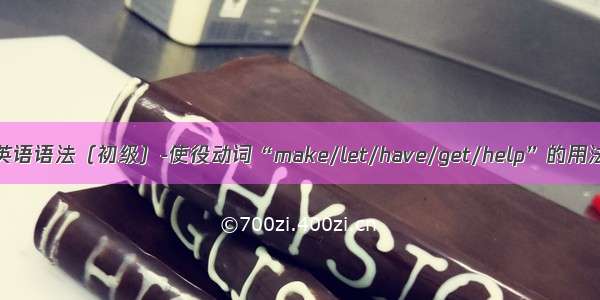
一、make用作及物动词,在主动语态中的含义主要有:
1. 做;制作;制造。 常用的句型是:
1) make sth. (to do sth.) 意为“制造某物”.
(1)She can make kites. 她会制作风筝.
(2)Can you make any mooncakes? 你会做些月饼吗?
(3)She makes her own clothes. 她自己做衣服.
2) make sb. sth. / make sth. for sb. 意为“为某人制作某物”.
(1)His mother made him a beautiful coat. /
Hismother made a beautiful coat for him.
他的母亲为他缝制了一件漂亮的外衣.
(2)She made a kite for her sister yesterday.
她昨天为她妹妹做了一个风筝.
3) 被动语态中常用be made of / from, be made in, be made by等短语来表示“……是由……制成的”,“……是在……制成的”和“……是被……制成的”.
(1)Wine is made from grapes[greɪps]葡萄.
酒是由葡萄酿制成的.
(2)These cars were made in Changchun.
这些汽车是在长春制造的.
(3)This kind of mobile is made in Beijing.
这种手机是北京制造的.
make后可跟双宾语,间接宾语后移时一般用for引导。如:
(1)My uncle will make me a kite.
= My uncle will make a kite for me.
叔叔将为我做一只风筝。
2. 使;使之。如:
(1)Have I made myself clear? 我讲清楚了没有?
(2)We made Jack our monitor at the meeting yesterday. 在昨天的会议上我们选杰克做班长.
3. 迫使;令。如:
(1)I don"t like milk, but she made me drink it.
我不喜欢牛奶,可是她强迫我喝。
(2)What makes you say that?
是什么(原因)让你说出那种话来./你为什么这么说?
(3)Nothing will make me change my mind.
无论什么事都不能使我改变主意./没有什么能让我改变主意。
注:在这一结构中,make后的动词不带to.
4. 总计;等于。如:
(1)Two and two makes four./Two plus[plʌs]加 two
equals[ˈi:kwəl]等于 four.
二加二等于四。
5. 准备;布置;整理。如:
(1)You must make the bed after you get up.
你起床后必须整理好你的床铺。
(2)Please make your bed before breakfast.
请在早饭前把床铺好.
6. 构成;组成;成为。如:
(1)Daniel scored[skɔ:d]得分,进球 another goal[gəʊl]球门, 目标.but one player does not make a team.
丹尼尔又踢进了一球,但一个球员不能组成一个球队。
7.制定、规定.
(1)They have made a study plan for this term.
他们已经制定了本学期的学习计划.
8.产生、引起(某事物).
(1)Don’t make any noise in class.
上课时不要弄出噪音.
(2)She’s always making trouble for her friends.
她总给朋友惹麻烦.
二、make用作及物动词,意为“使;让”,在主动语态中其后要跟省略to的不定式作宾语补足语,而在被动语态中,to不能省去。如:
(1)Don"t make the baby cry anymore["enɪmɔ:]不再 .
不要再让那个孩子哭了。
(2)She was made to wait for over an hour.
她被迫等了一个多钟头。
(3)Though[ðəʊ]虽然 he had often made his little
sister cry, today he was made to cry by his
littlesister.
虽然他曾经常把他小妹妹弄哭,但今天他被他小妹妹弄哭了。
make + sb. / sth. + 省略to的动词不定式, 意为“使某人或某物做某事”.例如:
(1)Our English teacher often makes us retell
[ˌri:ˈtel]复述the texts.
我们的英语老师经常让我们复述课文.
当把这样的句子变为被动语态时,原句中省略的动词不定式符号to必须要还原.如把上面的句子变为被动语态,应为:
We are often made to retell the texts (by our English teacher).
(2)She made all of us laugh. 她使得我们都笑
(3)we were made to laugh by her.
(4)Filth[fɪlθ]污秽and high prices have combined[kəm"baɪnd]结合的to make London and other cities depressing[dɪˈpresɪŋ]令人忧愁的places to live in.
污秽和高价的结合使伦敦和其他城市成为令人沮丧的居住场所。
(5)We should make these materials[mə"tɪərɪəlz]材料 of most value[ˈvælju:]价值.
我们必须使这些材料变得很有价值.
(6)It was the determination[dɪˌtɜ:mɪˈneɪʃn]决心that made life worth[wɜ:θ]值得的living for so many honest[ˈɒnɪst]诚实的people.
正是这种决心使许多诚实的人生活得有价值.
注意,若make不表示“使”,而表示其他意思则情况不同,比如下面两句,make后的不定式不是宾语补足语,而是目的状语:
(1)We make candles[ˈkændl]蜡烛 to give light.
我们做蜡烛照明。
(2)He made a box to put his money in.
他做了个盒子来装钱。
英语中,类似于make这种用法的动词还有let, have,
hear, see, watch, notice[ˈnəʊtɪs]通知, feel等。如:
(1)I saw him put the key into the keyhole[ˈki:həʊl] 锁孔, turn it and open the door.
我看见他把钥匙插进锁孔,转动钥匙,然后打开了门。
(2)She was seen to go into the classroom.
有人看见她进了教室。
用作使役动词,表示“使”,其后除可接不带to的不定式作宾语补足语外,还可以接以下成分:
1)接过去分词作宾语补足语。如:
(1)He tried to make his ideas[aɪˈdɪə]主意,想法 known.
他设法让别人知道他的想法/他试图把他的想法让别人知道
(2)She had to shout[ʃaʊt]呼喊to make herself heard.
她必须大声喊才能让人听见她说话。
注意,其后通常不接现在分词作宾语补足语。如:
他让司机在外面等他。
误:He made the driver waiting for him outside.
正:He had the driver waiting for him outside.
make(使)通常不接现在分词的复合结构作宾语。要表示使
某人或某事一直做某事或处于做某事的状态中,英语可用
havesb doing sth。如:
他讲的滑稽的笑话使大家都笑了。
误:His funny joke made everyone laughing.
正:His funny joke made everyone laugh.
2)接形容词作宾语补足语。如:
(1)Have I made myself clear?
我的意思说清楚了吗?/我说清楚了吗?
(2)We’ll do our best to make you happy.
我们会尽一切努力使你幸福。
3)接介词短语作宾语补足语。如:
(1)Sit down and make yourself at home请自便.
请坐,不要拘束。
三、make用作及物动词,后接复合宾语,表示“使……成为……;使成为……”时,通常由形容词、名词、介词短语充当宾语补足语。如:
(1)Loud[laʊd]大声的 music makes me uncomfortable[ʌnˈkʌmftəbl]不舒服的.
吵闹的音乐使我不舒服。
(2)The teacher tried [traɪd]尝试 his best to make himself a good friend of his pupils["pju:plz]学生.
那位老师尽力使自己成为学生的好朋友。
(3)The great news made her happy.
这个重大消息使她很高兴.
(4)Computers can make learning easier["i:zɪə]更容易的
and interesting.
电脑能使学习变得更容易更有趣.
当make的意思是“使、使得”时,一般用于“make + 宾语 + 宾补”这种结构,常用的句型是:
make + sb. / sth. + adj. 意为“使某人或某物处于某种状态”.例如:
(1)The news made him happy. 这个消息使他很高兴.
在此句型中,通常用it作形式宾语,而动词不定式或从句才是真正的宾语,而且要后置.例如:
(1)Computers make it easier to learn English.
电脑使英语学习更加容易.
当然,除了接形容词作宾补外,还可以接名词、动词的过去分词等作宾补.例如:
(1)They all want to make Jim their monitor.(名词) 他们都想让吉姆当班长.
(2)I spoke loudly[in ˈɔ:də tu:]为了make my voice
[vɔɪs]嗓音heard.(过去分词)
我大声地讲话,以便让别人听到.
四、有时可用作连系动词,表示“成为”“变成”等。
(1)She would have made an excellent[ˈeksələnt]杰出的,
优秀的teacher.
她本可以成为杰出的教师。
(2)That will make a good ending to the book.
那就成了这本书很好的结尾。
五、用于“be made+介词”
1)比较be made of与be made from:两者均表“由……制成”,但前者通常表示在制成品中还看得出原材料,而后者则通常表示在制成品中看不出原材料。如:
(1)The chair is made of wood.
这椅子是用木头做的。
(2)Some paper is made from wood.
有些纸是用木头做的。
但是,在现代英语中有时不完全按此区分。
2)比较be make out of与be made into:前者表示“由……制成”,后者表示“制成……”。两者有时可互换,并且根据情况也可与上面两个句型互换(注意词序的变化)。如:
(1)Rice can be made into wine.
米可以酿成酒。
(2)Wine can be made out of [from] rice.
酒可以由米酿成。
六、用于make it:
1)表示事业获得成功。如:
(1)You will make it成功if you try.
你会成功的,如果你努力的话。
(2)He’s never really made it使它as an actor.
他从未真正成为一名演员。
2)表示具体做成某事。如:
(1)You needn’t worry; he willmake it.
他不必担心,他会办成的。
(2)If you want to make it, better get开始doing.
如果你想把这事干成,就该动手了。/如果你想成功,最好开始行动。
3)表示设法做到某事。如:
(1)I’ve been我一直having violin[ˌvaɪəˈlɪn]小提琴
lessonsevery two weeks, but I think I’ll make
it every week from now on.
我一直每两个星期上一次小提琴课,但是我想从现在起每个星期都上课。
4)表示及时赶上火车等。如:
(1)The train leaves in five minutes—we’ll never
make it.
火车再有5分钟就开了——我们绝对赶不上了。
5)表示及时抵达某地。如:
(1)We are too late; I don’t think we canmake it.
我们太迟了,我想我们难以准时赶到了。
(2)I’m really sorry, but I won’t be able[ˈeɪbl]能够的
to make it来得及(on) Sunday after all毕竟.
真的很抱歉,我星期天根本赶不到。
6)表示约定时间。如:
(1)Let’s make it at 8:30. Is that all right for
you?
我们约定在8点半吧,这对你合适吗?
A:Shall we make it next week?
下个星期可以吗?
B:OK, let’s make it next week.
好的,咱们就定在下个星期吧。
7)表示病情好转。如:
(1)The doctor knew that the patient[ˈpeɪʃnt]病人 was
unlikely[ʌnˈlaɪkli]不可能的to make it.
医生知道那个病人没什么希望了。
(2)He had a high fever[hai ˈfi:və]高烧, but it
doesn’t mean意思是be couldn’t make it.
他发高烧,但这并不意味着他挺不过去。
注意,以下make it…结构中的it为形式宾语:
(1)I have to make it clear that my family is poor.
我得说清楚我家里很穷。
(2)I make it a rule定为常规to write in my diary[ˈdaɪəri]日记everynight.
我把每晚写日记当成一种习惯。
make+形容词(短语)+名词短语是一种倒装结构.为使句子结构保持平衡,通常将较长的名词短语移置补足语之后,不加引导词汇作形式宾语.如:
(1)The telescope[ˈtelɪskəʊp]望远镜madepossible [ˈpɒsəbl]可能的the observation[ˌɒbzəˈveɪʃn]观察ofthe far-off遥远的stars.
望远镜使人们能够观察遥远的星球.
(2)The primary aim of every punctuation mark is to make unmistakable the meaning of written words.
写作时应用标点符号的基本目的,是使所用词语的意义不致被误解.
3.make+it+形容词+不定式短语(从句)不定式短语或从句作宾语时,需移置宾语补语之后,在原来宾语的位置上用引导词it作形式宾语,从而使句子保持平衡.如:
(1)In order to make it easier for people to use computers,languages for writing programs have been devised.
为使人们易于使用计算机,便设计出了编写程序的语言.
(2)The company made it questionable whether the equipment should be employed at all.
这家公司对到底该不该使用这台设备产生了怀疑
四、常用短语
make a mistake 犯错误
make a noise 吵闹;弄出噪声,make noises 制造噪音
make a promise 答应;许下诺言
make a shopping list 写一个购物单
make up a prescription.开一个药方
make a telephone call 打电话
make friends with 与……交朋友, make friends 交朋友
make a contribution to 贡献给;捐献
make a decision 作出决定
make a face 做鬼脸
make a living 谋生;维持生活
make fun of 取笑;嘲笑
make it 约定时间;做到;按时到达
make money 赚钱
make one"s bed 铺床;收拾床铺
make one"s way to 往……走
make out 证明;认出;填写
make room for 为……让地方
make sure 确信;务必;弄清楚
make up one"s mind 下定决心,
make ... into 把……变成
make off 逃走make progress (取得进步),make faces 做鬼脸
make yourself at home 请自便
make oneself understood 使别人理解
make use of.利用
be made into。被制成
be made up of.由…组成
be made after.后做
make tea泡茶
make the train赶上火车
make the party参加聚会
make 20 miles in an hour一小时走20英里
make up 弥补;构成;编造;补偿;整理;排版
(1)One hundred yearsmake upa century[ˈsentʃəri]世纪.
一百年构成一个世纪
(2)made upan excuse[ɪkˈskju:s]借口.编造借口
(3)made upthe difference[ˈdɪfrəns]差异;差额in the bill.
弥补了帐单上的差额
(4)make upthe lost time.补偿失去的时间
(5)make upa room.把房间收拾好
(6)made up the front page.为封面排版
make用法练习(汉译英)
1. 昨天放学后老师为什么让他呆在教室里.
Why did the teacher make him stay in the classroom after school?
2. 你已经铺好床了吗?
Have you made your bed yet?
3. 小动物们选猴子为森林之王.
Small animals make the monkey the king of the forest.
4. 叫他上课不要做鬼脸.
Tell him not to make faces in class.
5. 自从她来到中国以来,她已经制作了二十多个飞机模型.
She has made over twenty model planes since she came to China.
6. 我已下定决心要学好英语.
I have made up my mind to learn English well.
7. 他说的话使我很伤心
What he has said makes me very sad.
8. 这些玩具狗是用木头做的.
These toy dogs are made of wood.
make用作使役动词表示 “使;使成为” 时,可跟复合宾语结构,即“make+宾语+宾语补足语”,其中的宾语补足语可以是不带to的不定式、过去分词、形容词或名词。现将make的复合宾语结构小结如下:
一、“make+宾语+n.” 意为“使、让某人 / 某物(成为)……”。
(1)We made him captain[ˈkæptɪn]上尉;船长 of our football team.
我们推选他作我们足球队队长。
(2)We made him our monitor.
我们选他当班长。
二、“make+宾语+adj.” 意为 “使某人 / 某事(变得)……”。
(1)The news that our team had won made us very happy. 我们队赢了的消息使我们大家非常高兴。
(2)We must make the rivers clean.
我们必须净化河水。 /我们必须使河流干净。
友情提示:当宾语是不定式短语或从句时,多用it作形式宾语。
(1)I made it a condition[kənˈdɪʃn]条件that everybody must be on time.
我提出一个条件,人人都要准时。
(2)The heavy rain made it impossible[ɪmˈpɒsəbl]不可能的
for us to go out.
大雨使得我们无法出去。
三、“make+宾语+do sth.(不带to的不定式)”意为 “使某人做某事”。
What makes the grass grow?什么东西使得草生长?
Our teacher make us feel more confident.我们的老师让我们更加自信。
友情提示:在被动语态中,此类结构中省略的动词不定式to要还原。
The boy was made to work twelve hours a day.这个男孩被迫每天工作12小时。
Every day I am made to have an egg and some milk./ I have to eat an egg and drink some milk every day.每天我都要吃鸡蛋和牛奶。/我每天要吃一个鸡蛋,喝一些牛奶。
相关链接:have, make,let等使役动词和see,hear,listen to,look at,,watch,notice,obser等感官动词可接不带to的不定式作宾补。heip后可带to也可不带to.
Let him he do whatever he wishes to do让他做他想做的事
Did you see him go out?你看见他出去了吗?
I often help my mother (to) do some housework.我经常帮妈妈做家务。
区别be made of , be made from , be made in和be made into06月21日 星期六 09:47 P.M.(1) be made of表示"由…制成", 一般指能够看出原材料,或发生的是物理变化。
This table cloth is made of paper.这张桌布是由纸做的。
This salad is made of apples and strawberries.这种沙拉是由苹果和草莓做的。
(2) be made from也表示"由…制成",但一般指看不出原材料,或发生的是化学变化。
Bread is made from corn.面包是小麦做的。
The lifeboat is made from some special material.这个救生艇是由某种特殊材料制成的。
(3) be made in指的是产地,意思为"于…制造"。
The caps are made in Russia.这些帽子产于俄罗斯。
My mother likes to buy things which are made in China.
我妈妈喜欢买中国产的东西。
(4) be made into的意思为"被制成为…"。
This piece of wood will be made into a small bench. 这块木头将要被制成一个小凳。
The paper has been made into clothes for the doll. 纸被做成了洋娃娃的衣服。
















